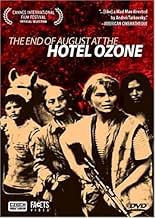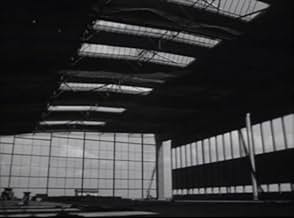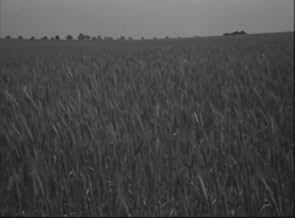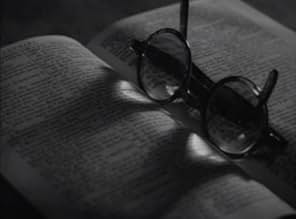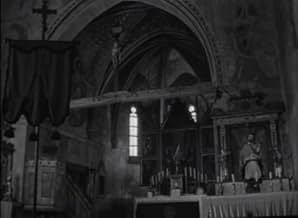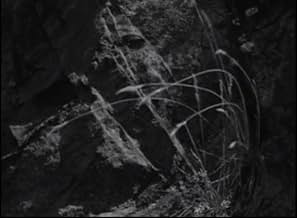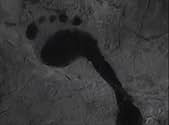Agrega una trama en tu idiomaA troupe of young women on post-apocalyptic earth are lead around by a mistress born before the war, eventually stumbling into the company of a lonely old man.A troupe of young women on post-apocalyptic earth are lead around by a mistress born before the war, eventually stumbling into the company of a lonely old man.A troupe of young women on post-apocalyptic earth are lead around by a mistress born before the war, eventually stumbling into the company of a lonely old man.
Opiniones destacadas
I like the slow pace of the movie. Nothing happens for ages... And there's a lot of theatrical pathos. Nonetheless, what I like very much, is a kind of budget-wise method applied in the movie. Most of it happens in the open meadows - I suppose in some old abandoned army area somewhere in Czechoslovakia. Nothing much is shown, we can just guess.
I have to admit, the film is really interesting. It is one of those few sci-fi films which have been made within famous Czechoslovakian film industry. There are few more rare and interesting titles which I recommend to see. Try "Upír z Ferratu" = Vampire from Ferrat (funny quotation of the classical film horror icon "Nosferatu") - film from 80' from a Czech director Juraj Herz. Kind of weird biotech sport car movie about a racing car which sucks the driver's blood... Reminds David Cronenberg.
to hall 900: I just wanna mention, the old woman Martha, you like so much, is not called Ondřej Jariabek - he is the old man, but she is Jitka Hořejí.
I have to admit, the film is really interesting. It is one of those few sci-fi films which have been made within famous Czechoslovakian film industry. There are few more rare and interesting titles which I recommend to see. Try "Upír z Ferratu" = Vampire from Ferrat (funny quotation of the classical film horror icon "Nosferatu") - film from 80' from a Czech director Juraj Herz. Kind of weird biotech sport car movie about a racing car which sucks the driver's blood... Reminds David Cronenberg.
to hall 900: I just wanna mention, the old woman Martha, you like so much, is not called Ondřej Jariabek - he is the old man, but she is Jitka Hořejí.
It is 25 or so years after a nuclear war, and a few hardy young women, and an older leader, are wandering (in Czechoslovakia?) in search of canned food from before the war that can be safely eaten. No men apparently survive, being less resistant to radiation. They come across a mountain resort hotel, the Hotel Ozone, where an old man lives alone with a wind-up record player and old books and magazines. The young women, raised as barbarians, act the part. The person who introduced me to this chilling movie pointed out that science fiction movies were supposed to have monsters, and suggested looking for the monsters in this one. The B&W cinematography is great, especially in scenes of the women practicing their horseback riding skills and exploring a ruined town. You'll never be able to hear the tune "Roll Out the Barrel" the same way again.
I remember seeing a small handbill in a college basement around 1980. One of the films to be screened was THE END OF AUGUST AT THE HOTEL OZONE. The title intrigued, but, being the typical "too busy College Student" I did not attend the showing. So, for about a quarter century the title just lingered in my memory. Unreachable. I've NEVER heard of it screening anywhere, playing on TV or available on video or DVD (even in bootleg form). The title itself was so tantalizing, promising perhaps something apocalyptic (END OF "THE WORLD" not "AUGUST" perhaps?) or mysterious (a Hotel in the Ozone Layer?). And, of course, its sheer scarcity could only enhance the mystery, the suspense. Then, there it was in the American Cinematheque schedule. Oh, NO, I wasn't going to miss it this time! I had been up for work since 4 AM (!) and had worked a full 12 hour day. But, I was NOT to be denied! While the film does not quite live up to its evocative title (there was no reasonable way it could), it's still a fine Eastern European contribution to the Post-Nuke, End-Of-The-World and Lord of the Flies sub-genre(s).
After an oblique reference to the Nuclear calamity that man inflicted upon itself some 15 years earlier, the film proper begins slowly as we come to find a band of young, presumably fertile women, led by a wise old sage. I emphasize the word slowly, because the pace is off-putting at first. Events do happen and we get a picture of the women's pathetic and lonely existence. I particularly admired the fact that they are not scrubbed clean, shaved, manicured and primped and prettified as they doubtless would have been in an American production - Remember all those "lost women" films where the tribal women look like beauty contestants (indeed a couple of the actresses are very attractive, just unkempt)?! But, the glacial pacing is almost enough to drive most viewer's patience beyond the brink. Once the group stumbles upon an old man and his "Hotel Ozone", the film comes into its own. While the viewer is naturally inclined to sympathize with the women (if they had been men would we be so accepting?) despite some cruel, savage and disturbing activities (particularly towards animals), slowly we come to see a fuller and less positive view towards them. This reversal is doubtless intentional and packs a strong visceral punch. The final images of this band of lost ladies wandering a barren landscape is both heart-breaking and depressingly believable.
It's to the film's credit that we are not given a false or tidy ending: Befitting a title as gloriously ambiguous as THE END OF AUGUST AT THE HOTEL OZONE.
After an oblique reference to the Nuclear calamity that man inflicted upon itself some 15 years earlier, the film proper begins slowly as we come to find a band of young, presumably fertile women, led by a wise old sage. I emphasize the word slowly, because the pace is off-putting at first. Events do happen and we get a picture of the women's pathetic and lonely existence. I particularly admired the fact that they are not scrubbed clean, shaved, manicured and primped and prettified as they doubtless would have been in an American production - Remember all those "lost women" films where the tribal women look like beauty contestants (indeed a couple of the actresses are very attractive, just unkempt)?! But, the glacial pacing is almost enough to drive most viewer's patience beyond the brink. Once the group stumbles upon an old man and his "Hotel Ozone", the film comes into its own. While the viewer is naturally inclined to sympathize with the women (if they had been men would we be so accepting?) despite some cruel, savage and disturbing activities (particularly towards animals), slowly we come to see a fuller and less positive view towards them. This reversal is doubtless intentional and packs a strong visceral punch. The final images of this band of lost ladies wandering a barren landscape is both heart-breaking and depressingly believable.
It's to the film's credit that we are not given a false or tidy ending: Befitting a title as gloriously ambiguous as THE END OF AUGUST AT THE HOTEL OZONE.
The movie was made during the communist era and regardless of the directors/screenwriters political stance, the film definitely has a slighty disgusting, uncomfortable communist touch to it.
It's one of this films that nobody gets and that's gloomy, minimalist and hermetic. The characters speak in riddles and nothing ever happens, nor does anything ever get explained.
A "troupe" of barbarian like women (so much for communism) walks around through a desolate landscape and doesn't do much, as said before.
The only actual motif or repeating element in the film is the animal cruelty. Dogs are getting beaten (to death), women throw snakes around and at other women and horses are getting pulled by their mane.
Not of it ever makes sense or is getting explained. Needless to say that self professed armchair critics don't seem to have a problem with animal cruelty in this film (or when women are the perpetrators).
All in all this isn't even a good film for the usual undemanding b-movie-fans, sci-fi-nerds or other advocates of bad taste.
It's one of this films that nobody gets and that's gloomy, minimalist and hermetic. The characters speak in riddles and nothing ever happens, nor does anything ever get explained.
A "troupe" of barbarian like women (so much for communism) walks around through a desolate landscape and doesn't do much, as said before.
The only actual motif or repeating element in the film is the animal cruelty. Dogs are getting beaten (to death), women throw snakes around and at other women and horses are getting pulled by their mane.
Not of it ever makes sense or is getting explained. Needless to say that self professed armchair critics don't seem to have a problem with animal cruelty in this film (or when women are the perpetrators).
All in all this isn't even a good film for the usual undemanding b-movie-fans, sci-fi-nerds or other advocates of bad taste.
This one heralds later works, Cormac Mccarthy's The Road and Michael Haneke's Time of the Wolf among them. It's a journey through a bleak barren landscape where characters are lost in it rather than found, set after an unspecified apocalypse that leaves the world an empty desolate place, not the end of the world like in an Emmerich film where destruction is an exciting spectacle to witness as but rather "an" end to the world, a hazy blur of abandonment filled with residues of mystery and nameless violence.
The film is a blank canvas. Distraught characters are violent and aimless. The land works by some other order. Where people like Herzog, Malick or Tarkovksy found things of spiritual importance to say on this other order, Schmidt's film is empty and distanced. When the film needs to be stark, animals are murdered for the camera, a dog is shot or a cow is slaughtered. The basic means of expression in The Road are poetic, here they are allegoric. As the characters of McCarthy's novel stagger starved and hopeless through the scorched macadam we can taste bitter ash in our mouths. Here they simply walk through shrubs. We don't fear for their souls, so to speak.
And then it gets interesting because the rugged band of amazons stumbles upon the ruins of an old hotel in the middle of the forest and there's an old man living there alone who sees in the young girls (all born after the apocalypse so they don't even have a word for "man" or "grammophone") a new future, new mothers for a new civilization of men. The first among the women, the leader, an old woman who was young before the apocalypse and can remember a time when "the cans didn't rust and the land didn't despise us", she doesn't allow herself to be dragged along on new hope, she is resigned to the end of times. The end is bleak and poignant, a hopeful future is not suggested, and the tiny pocket that preserves the civilization of the old world (where gramophones play music, where cows still make milk) is left behind to rot in the forest. What The End of August at the Hotel Ozone says about the communist regime of the time is at once vague enough to fool censors but clear in emotional duress.
This was a very interesting precursor to dystopian films that deal with the end of the world in sombre quiet terms. If it's not terribly successful it's because it's faintly groping in the dark where no one else had gone before, because it uses vague characters to sketch a very clear picture in allegory.
The film is a blank canvas. Distraught characters are violent and aimless. The land works by some other order. Where people like Herzog, Malick or Tarkovksy found things of spiritual importance to say on this other order, Schmidt's film is empty and distanced. When the film needs to be stark, animals are murdered for the camera, a dog is shot or a cow is slaughtered. The basic means of expression in The Road are poetic, here they are allegoric. As the characters of McCarthy's novel stagger starved and hopeless through the scorched macadam we can taste bitter ash in our mouths. Here they simply walk through shrubs. We don't fear for their souls, so to speak.
And then it gets interesting because the rugged band of amazons stumbles upon the ruins of an old hotel in the middle of the forest and there's an old man living there alone who sees in the young girls (all born after the apocalypse so they don't even have a word for "man" or "grammophone") a new future, new mothers for a new civilization of men. The first among the women, the leader, an old woman who was young before the apocalypse and can remember a time when "the cans didn't rust and the land didn't despise us", she doesn't allow herself to be dragged along on new hope, she is resigned to the end of times. The end is bleak and poignant, a hopeful future is not suggested, and the tiny pocket that preserves the civilization of the old world (where gramophones play music, where cows still make milk) is left behind to rot in the forest. What The End of August at the Hotel Ozone says about the communist regime of the time is at once vague enough to fool censors but clear in emotional duress.
This was a very interesting precursor to dystopian films that deal with the end of the world in sombre quiet terms. If it's not terribly successful it's because it's faintly groping in the dark where no one else had gone before, because it uses vague characters to sketch a very clear picture in allegory.
¿Sabías que…?
- TriviaDana Medrická was originally considered for the part of Old Woman, eventually played by Beta Ponicanová.
- ErroresThe girls were born into a post-apocalyptic world, but at least one of them has a vaccination scar.
- ConexionesEdited into CzechMate: In Search of Jirí Menzel (2018)
Selecciones populares
Inicia sesión para calificar y agrega a la lista de videos para obtener recomendaciones personalizadas
- How long is Late August at the Hotel Ozone?Con tecnología de Alexa
Detalles
- Fecha de lanzamiento
- País de origen
- Idioma
- También se conoce como
- Late August at the Hotel Ozone
- Productora
- Ver más créditos de la compañía en IMDbPro
- Tiempo de ejecución1 hora 17 minutos
- Color
- Mezcla de sonido
- Relación de aspecto
- 1.37 : 1
Contribuir a esta página
Sugiere una edición o agrega el contenido que falta

Principales brechas de datos
By what name was Konec srpna v Hotelu Ozon (1967) officially released in Canada in English?
Responda
